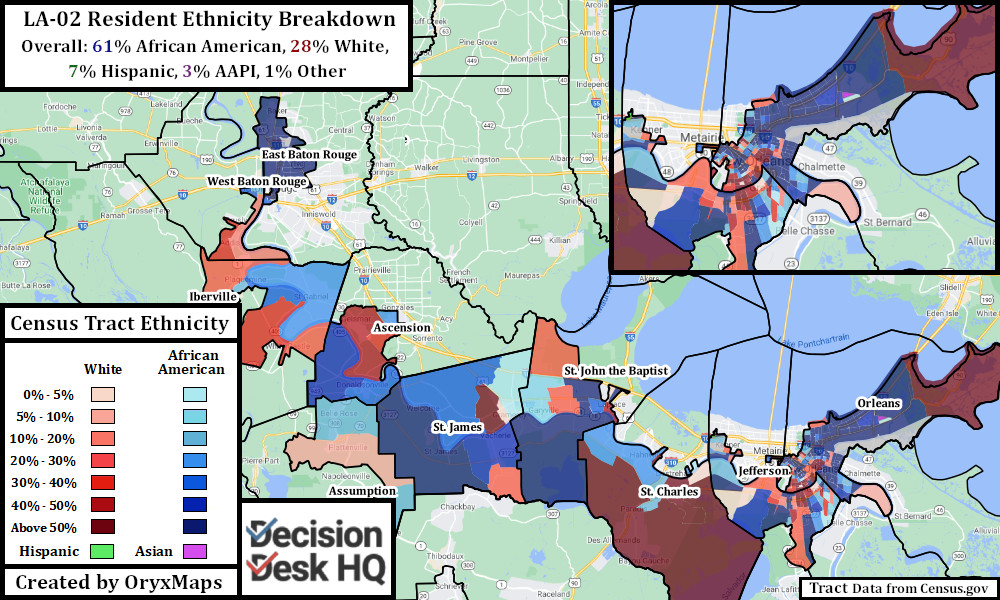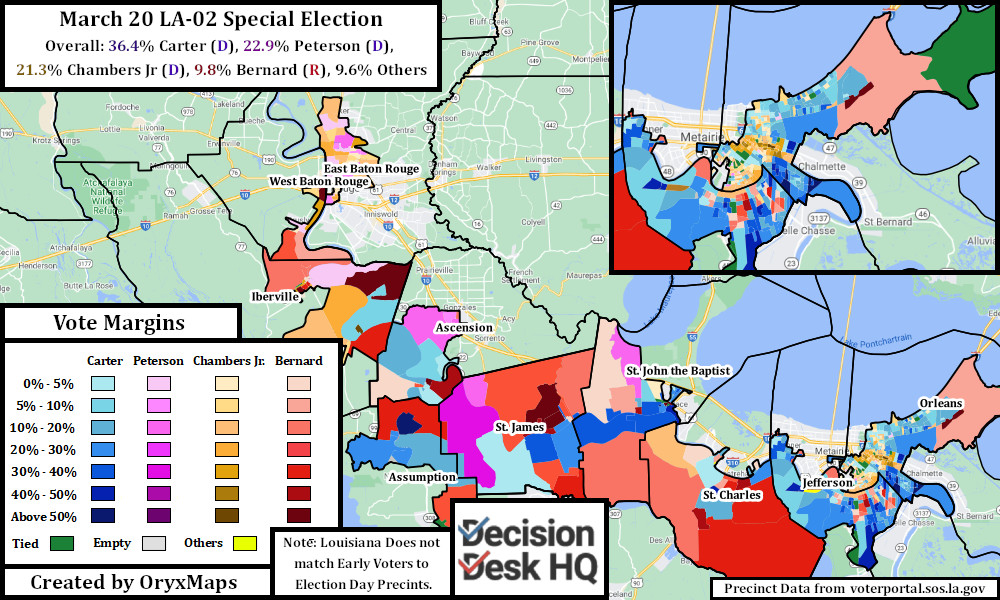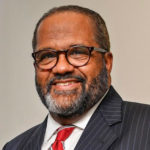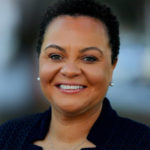Voters in Louisiana’s Second Congressional district vote in a special Congressional election runoff tomorrow. LA-02 became vacant when incumbent Democrat Cedric Richmond resigned January 15 to join the Biden administration. None of the 15 candidates running to replace Richmond won a majority of support in the all-party March 20 special election, necessitating a runoff under Louisiana law. LA-02’s overwhelmingly African American and Democratic electorate decides between two African American Democrats: State Senators Troy Carter and Karen Carter Peterson.
The multifaceted, multiracial, and multi-factional nature of New Orleans politics offers both candidates the opportunity to represent Louisiana in Congress.
The District

Louisiana’s Second Congressional District is the product of gerrymandering. Voting Rights Act (VRA) litigation necessitates grouping southern Louisiana’s African American population into a single district, but the VRA does not require mappers to pair New Orleans’ and Baton Rouge’s African American communities. Legislative Republicans’ desire for safe seats across the rest of the state forced the two Democratic cities into one district. The result is a district almost 62% African American by resident population. Nearly 69% of residents are in New Orleans or the Jefferson Parish suburbs, 14% are in the two Baton Rouge Parishes, and the remaining 17% reside in the string of small “River Parishes” connecting the two cities. Both Joe Biden in 2020 and Hillary Clinton in 2016 won approximately 75% of the vote in this safe Democratic district.
Demographics fail to capture the intricacies of New Orleans political factionalism. New Orleans city politics is a labyrinthine network of rivalries and alliances, a situation similar to most municipalities where one party holds a permanent power monopoly. Intra-party rivalries emerge from deals made between city politicians to ensure a neighborhood’s desires receive legislative attention.
The Candidates
Both Troy Carter and Karen Carter Peterson are products of New Orleans factionalism, and this factionalism is the source of their electoral enmity. Their legislative records are ideologically similar, but differences in patrons and political upbringings aligned each candidate with opposing city factions. Peterson opposes Cedric Richmond, and Carter is Richmond’s ally. Carter’s support from the former representative encouraged him to campaign as an ally of the Biden’s administration and its policies. Peterson, in contrast, campaigned as a progressive, layering her personal rivalry with contrasting ideological positions.

 Troy Carter’s leading position in the all-party special election makes him the tentative frontrunner in the runoff. Carter spent 30 years in and out of New Orleans city politics before he won election to the Algiers-based State Senate District 7 in 2015. Carter’s legislative alliances won endorsements from African American state legislators, and the Richmond endorsement generated support from the former Congressman’s allies in New Orleans and from the Congressional Black Caucus members in Washington. Prominent local endorsers include New Orleans District Attorney Jason Williams and Baton Rouge mayor Sharon Weston Broome. Carter previously enjoyed the support of special election voters within suburban Jefferson Parish, the connecting River Parishes, and outlying New Orleans neighborhoods of Algiers, Gentilly, and The East.
Troy Carter’s leading position in the all-party special election makes him the tentative frontrunner in the runoff. Carter spent 30 years in and out of New Orleans city politics before he won election to the Algiers-based State Senate District 7 in 2015. Carter’s legislative alliances won endorsements from African American state legislators, and the Richmond endorsement generated support from the former Congressman’s allies in New Orleans and from the Congressional Black Caucus members in Washington. Prominent local endorsers include New Orleans District Attorney Jason Williams and Baton Rouge mayor Sharon Weston Broome. Carter previously enjoyed the support of special election voters within suburban Jefferson Parish, the connecting River Parishes, and outlying New Orleans neighborhoods of Algiers, Gentilly, and The East.
 Karen Carter Peterson framed her progressive message within the context of environmental reform. Peterson’s resume incudes 20 years of legislative work and experience chairing the state Democratic party from April 2012 to September 2020. The theme of her campaign is environmental racism, highlighting ecologically damaged communities like the River Parish region derogatively known as “Cancer Alley.” Her campaign earned endorsements from environmental groups including the Sierra Club and the League of Conservation Voters. Peterson’s candidacy enjoys additional support from women’s activist groups including Emily’s List. New Orleans mayor LaToya Cantrell and Stacy Abrams focused on the historic opportunity to elect a woman of color when they endorsed Peterson. Key to Peterson’s support though are the progressive groups attracted to her campaign’s themes and promises. This includes both national progressives like Our Revolution and Alexandria Ocazio-Cortez, and local activists like third-place progressive candidate Gary Chambers Jr. Peterson’s support during the all-party special election came mainly from Baton Rouge and uptown New Orleans.
Karen Carter Peterson framed her progressive message within the context of environmental reform. Peterson’s resume incudes 20 years of legislative work and experience chairing the state Democratic party from April 2012 to September 2020. The theme of her campaign is environmental racism, highlighting ecologically damaged communities like the River Parish region derogatively known as “Cancer Alley.” Her campaign earned endorsements from environmental groups including the Sierra Club and the League of Conservation Voters. Peterson’s candidacy enjoys additional support from women’s activist groups including Emily’s List. New Orleans mayor LaToya Cantrell and Stacy Abrams focused on the historic opportunity to elect a woman of color when they endorsed Peterson. Key to Peterson’s support though are the progressive groups attracted to her campaign’s themes and promises. This includes both national progressives like Our Revolution and Alexandria Ocazio-Cortez, and local activists like third-place progressive candidate Gary Chambers Jr. Peterson’s support during the all-party special election came mainly from Baton Rouge and uptown New Orleans.
The Results
Both candidates are Democrats. Despite accusations during the campaign, both will cooperate with Washington’s Democratic leaders. Both candidates possess paths to victory through the network of local New Orleans and Baton Rouge politics. The runoffs result are however unlikely to be final. Redistricting is coming. Even if Louisiana does not conform to Governor John Bel Edwards’s desire for a second African American congressional district, the Baton Rouge gerrymandering will be undone. The composition of LA-02’s electorate will likely shift in favor of the New Orleans region. Limited incumbency benefits and a shifted electorate will open the door for the loser of the special election runoff to attempt a comeback. Personal rivalries encourage both candidates, or their factional allies, to face each other again in 2022.
Ben Lefkowitz (@OryxMaps) is a Contributor to Decision Desk HQ.